I will be on vacation next week and, in light of events decided y'all deserved an early present. So think of this as Volume 16, Number 34 of A-Clue.com, the online newsletter I've written since 1997. Enjoy.
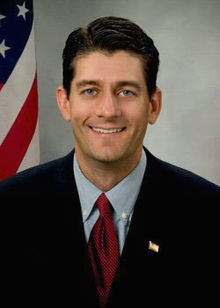 The 1972 Game is about validation.
The 1972 Game is about validation.
The second election after an existential crisis is about generational direction. Forward or back, future or past. And it always results in a resounding victory for the new way forward.
I didn't think until last week it was possible to get a decisive result out of 2012, what with the economy sputtering along so weakly.
But now it's possible.
Because in picking Paul Ryan, Mitt Romney picked the very embodiment of the ideas that failed my generation, and the antithesis of the Obama Thesis of Consensus.
Paul Ryan is a Randian theorist, someone who truly believes that those who can't make it should pound sand, that there is no such thing as an “entitlement” people can earn from government. He is the natural extension of Ronald Reagan's rhetoric.
Paul Ryan is Reaganism writ large, and I think he'd call that a compliment.
Which is the point. Any set of principles can become an -ism, and there is nothing more destructive than an -ism in power. The ideas of Karl Marx for an egalitarian society weren't that terrible. Communism sucked.
There is no magical -ism, no single set of principles that create the right policy for every age. There is only muddling along, making mistakes, and going forward.
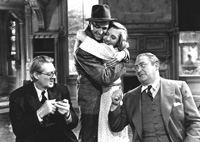
“When things go a little bad nowadays, you go out, get yourself an -ism and you're in business.” Then a moment later, “ Lincoln said, 'With malice toward none, with charity to all.' Nowadays they say, 'Think the way I do or I'll bomb the daylights outta you.'”
For my first few years studying history at this blog I was searching for a new “thesis,” a new set of myths and values that would translate into power for my kids' generation. When it emerged I christened it “The Obama Thesis of Consensus” I wrote this right after the inauguration:
Real political transformation consists of defining the center and causing everyone else to realign around that center.
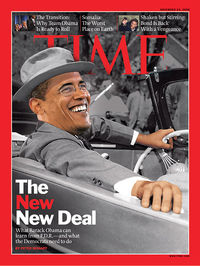
Richard Nixon came from Eisenhower, FDR came from Wilson, Teddy Roosevelt came from Grover Cleveland, and Lincoln came from Henry Clay. In that same way, the ideas of Barack Obama are those of the Clinton era. Only instead of leaning against the old ideas, as Clinton leaned against Nixonism, the Obama Thesis stands as a new center.
Contrast this with what the old assumptions do, as their Thesis fades from view. The FDR Thesis of unity evolved into the Democratic Tribes of the McGovern era. The Progressive ideas of McKinley and Theodore Roosevelt turned into Hooverism. The Union of Lincoln's day turned into the economic corruption Progressives and Populists both fought to renounce. And southern rights became the Confederacy.
What has happened to Nixon's Thesis, as validated by Ronald Reagan, is that it has become an -ism, an ideology that is absolute in its application, that seems to explain hard questions simply, and that always provides the same answer to the questions of any time. Cut taxes, cut government, trickle down, call that freedom, and those who have the most must deserve it. (Never mind how many of those betters started as heirs, like Donald Trump.) It's a Buddenbrooks tale that leads inevitably to Paris Hilton for President in 2032.
Reaganism, in short, leads directly to feudalism.
But as I've said before, this tendency to turn a set of good principles into a crappy -ism is a natural impulse in America. Among those who have believed in and practiced one set of assumptions all their lives, the idea that it may have reached its sell-by date seems like a rejection of their very lives. They yell the same things louder-and-louder, as George W. Bush did during his tragic fall (and yes it was as tragic as James Buchanan's). They then double-down on those ideas once out of power, as Paul Ryan and the Tea Party crowd has.
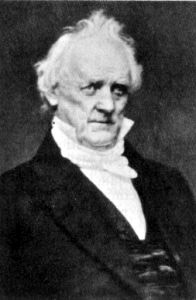
That's where we are today. That's the 1972 game. It's also the 1936 game, the 1900 game, the 1864 game, the 1832 game and the 1804 game. It is the natural progression of American politics, the way we evolve new ideas to fight the new challenges of each new era. We seek a new center, we find it in the last generation's opposition, then we validate it so it is no longer dependent on the crisis leader, but is internalized by a generation. Until a new crisis emerges for which it is unfit, until it turns into an -ism in its turn. Then the cycle goes around again.
As it was with Lincoln, as it was with McKinley, as it was with FDR, and as it was with Nixon, so it is with President Barack Hussein Obama. He is a true son of a Stevenson Democrat, Stanley Ann Dunham, who was raised by two Roosevelt Democrats, veterans of World War II. There is nothing exotic about him save his being born at the end of their dream, in Hawaii. His story is quintessentially American. His story would be impossible anywhere but 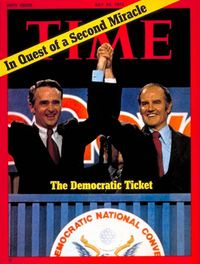
Today George McGovern found his Eagleton. Now we campaign to make that so.









